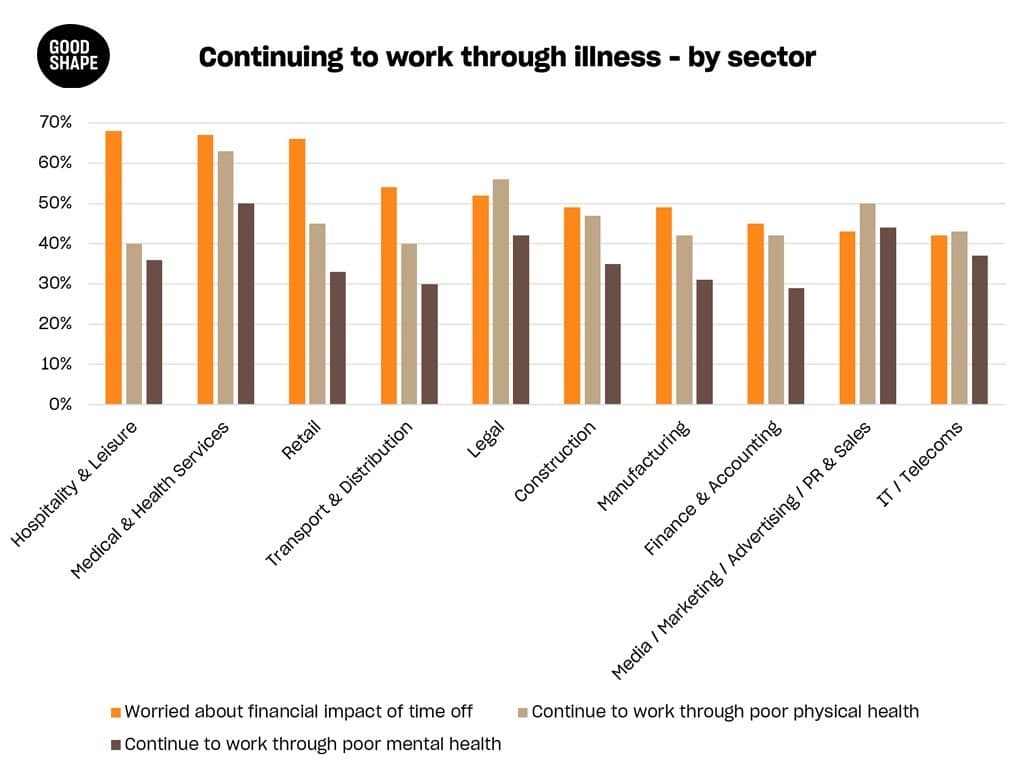Research into health, wellbeing and the impact of financial implications on home life has revealed that 54% of employees working in the transport sector are worried about sick leave.
Over half (52%) of UK employees are worried about the financial implications of taking time off work for a physical or mental illness, according to a cross-sector survey commissioned by wellbeing and performance experts GoodShape and completed by YouGov.
Transport sector employees are not alone in their concerns, however. More workers in the Hospitality & Leisure sector appear to be worried about the financial implications of taking time off sick than in other sectors, with 69% of employees concerned, closely followed by those working in Medical & Health Services (68%) and Retail (68%). Other sectors are also impacted by concerned workers worried about the financial implications of taking time off: Transport & Distribution (54%), Legal (52%), Construction (49%), Manufacturing (49%), Finance & Accounting (45%) and Media, Marketing & PR (43%) and IT / Telecoms (42%).
British employees working through physical illness
Nearly half of employees (46%) surveyed continued to work in the last year whilst experiencing a physical health condition. Looking at specific sectors, 40% of workers in transport say they continued to work through physical illness in the last year. Over four in ten employees in Construction (47%), IT & Telecoms (43%) and Manufacturing (42%), and four in ten in Hospitality & Leisure (40%) continued to work whilst physically ill during this time.
British employees working through mental illness
Over one in three employees (36%) surveyed say they continued to go to work with a mental health condition in the last year. In transport, nearly a third of Transport Workers (30%) continued to work through poor mental health – this was on the lower end of the spectrum compared to other sectors. More than a third of employees in IT & Telecoms (37%), Hospitality & Leisure (36%), Construction (35%) and Retail (33%) continued to work through a mental health condition.

Alun Baker, CEO of GoodShape said: “The cost-of-living crisis is magnifying a longer-term employee health emergency. Employees who ‘power through’ illnesses tend to develop longer-term conditions. The implications of coming into work whilst ill include spreading illnesses like Flu and COVID across the organisation like wildfire. Times are tough for employees and employers alike but giving your people reassurance that you have their health at heart – providing free access to professional medical support, for example – pays dividends for the health of your business too; not least in how you’re seen as an employer. Let’s not forget, good health and workforce productivity are inextricably linked so looking after your people makes sense for everyone.”
More women than men continue to work when sick
Over half of women (53%) surveyed kept on working whilst experiencing a physical health condition compared to 39% of male employees in the last year. Younger workers were more likely to work whilst suffering a physical health condition, with 55% of under 35s continuing to work whilst physically ill. Employees aged over 55 were least likely to continue working whilst physically ill – only 34% worked through a physical illness. When it comes to taking time off work for mental health conditions, 43% of women continued to work during this time, compared to 29% of men. Younger workers were more likely to work whilst experiencing a mental health condition, with 52% of under 35s continuing to work compared to 22% of employees aged over 55.
Financial worries negatively impacting ability to work
The survey findings also potentially highlight the wider impact of the cost-of-living crisis on employees’ everyday working lives. Over half (57%) of employees say that worrying about finances negatively impacts their ability to do their job. Younger employees feel the impact of financial worries on their work more than their older colleagues, with 63% of workers aged under 35 citing financial concerns as having an impact on their ability to do their job. This compares to 59% of workers aged 45-54, 57% of employees aged 35-44 and 50% of employees over 55.
Worrying about finances negatively impacts Transport workers and their ability to do their job, with 58% stating that it has impacted their work. Over half of employees in other sectors say they are feeling the impact: Manufacturing (59%), Medical & Health Services (58%), Legal (58%), Construction (57%), Hospitality & Leisure (56%), Finance & Accounting (55%) and IT & Telecoms (54%).







































 0113 2082620
0113 2082620 info@railbusinessdaily.com
info@railbusinessdaily.com 15 Mariner Court, Wakefield WF4 3FL
15 Mariner Court, Wakefield WF4 3FL

